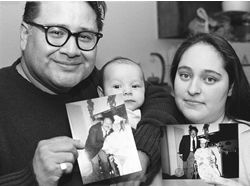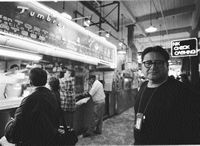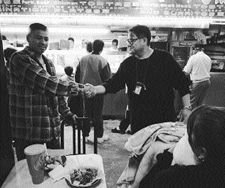|
Making a Difference February 2001
Los Angeles emergency response worker Jacob Ocampo has dedicated his life to helping children and parents become healthy families. He developed a parenting curriculum for Spanish-speaking parents, conducted parenting classes, and uses his time off to educate the community about child welfare issues. He understands the issues parents and children face. “I had a rough childhood, and it’s only by a miracle that I didn’t end up in the system,” he states. “My dad used to beat me and my teachers would ask me why I had bruises all over my arms and legs. That was back in the 1960s and 1970s, before there were mandated reporting laws.” Ocampo’s
father immigrated from Guatemala and didn’t understand how to raise
a child in this culture. Ocampo has taken it on himself to provide the
information his father didn’t have to members of the community, especially
Latinos.
Ocampo describes
some of the difficulties parents have once their children, especially
teenagers, are in the foster care system. “Latino parents are very
protective of their kids. They believe in strict discipline and use corporal
punishment as part of caring for their children. All of a sudden, when
a child is in a foster home, the child is overwhelmed with the freedom
that foster parents give them. They are in a setting that they have never
see before. They have more freedom at school, more freedom to stay out
late at night, better schools, better food, more affluence. Normally in
a traditional culture girls may not date until they are 17 or 18, but
in this culture they can go out when they are as young as 10 or 11. And
boys too, they can stay out late. In Latino culture they have to be in
by 9:00 or earlier than that. I don’t remember being able to stay
out past 9:00. Then there is the issue of the clothes these days–being
able to wear real loose clothing that their parents may not let them wear,
but in a foster home they can wear whatever they want. The baggy pants
and caps turned around. Foster parents do a great job at what they do,
but it is different. A lot of teenage kids don’t want to go back
to obeying their parents and will do things to end up back in foster care.” Siempre
Padres Always Parenting “We get them to look at what type of interaction they are having with their children, how much quality time they are willing to devote, and for them to realize that will determine what type of relationship they will have with their children...People are getting lost working two jobs. They leave TV to educate their kids. Wake up in the morning, give them a breakfast bar, then to school. When school is over the kids go to after-school programs, and we don’t see them until we pick them up at 6:00 pm.” Ocampo knows the problem; as a social worker in LA county, working overtime, he has to struggle with his own schedule to be there for his own children– a regret that many children’s social workers express.
|
||||||||




